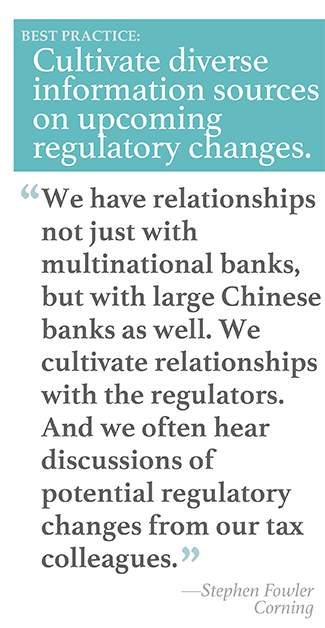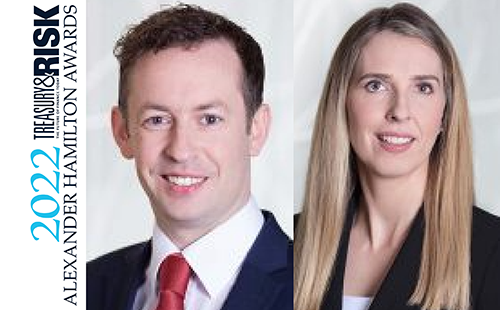
In 2015, Corning Incorporated began communicating to the investment community about its new Capital Allocation Framework, a strategic plan designed to reduce the cash on the company's balance sheet and increase the returns it was earning on invested capital. Previously, Corning had about $5.5 billion worth of cash on its books worldwide. The Capital Allocation Framework aimed to reduce that by more than half.
"In order to do that, we needed to be able to access all our cash globally, wherever it was," explains Steve Propper, Corning's vice president and corporate treasurer. "The more fungible our cash is, the more liquidity we have on a global basis."
A significant amount of excess cash was stuck in Asia, where Corning generates nearly one-third of its global revenue. "Because so many of our legal entities are offshore, it's crucial for us to be able to manage that liquidity effectively," says Stephen Fowler, director of liquidity and investment management for Corning. "China is a key part of that puzzle."
When new regulations in the Shanghai Free Trade Zone allowed for more flexibility in cash management, Corning formed a large domestic cash pool to support business operations within China. "It's technically not cash pooling the way that you'd think of it in other locations," Fowler says. "It's actually a series of entrustment loans, where the legal entity puts money on deposit with the bank and the bank lends it to a delegated entity."
This structure is more complex than a Western cash pool. "You have to have all the legal entities on board, opening their bank accounts; understanding the structure; and coordinating with tax, treasury, and shared services," Fowler says. Still, development of the domestic-China pool-like structure improved the company's in-country liquidity.
Once the Chinese structure was in place, Corning wanted to be able to move those funds cross-border to entities in the United States or other regions. "We wanted to make that cash more available to the rest of the company, to support investments and growth opportunities around the world," Propper says.
To achieve that goal, the company would need to connect its China cash pool to its European cash pool. This wasn't an option when the company's Capital Allocation Framework launched, but in late 2017, the Chinese government began allowing legal entities established in the Shanghai Free Trade Zone to implement cross-border cash sweeps. Corning's regional headquarters, which acts as the pool header for its China cash pool-like structure, is located in the Shanghai Free Trade Zone, so the treasury team saw their opportunity.
Fowler and Propper launched an initiative that would link Corning's Chinese and European cash pools. Their first step was to consult with leaders in several other key internal functions. "One of the first groups we engaged with was our tax group, to make sure we were not doing ourselves any disservice in the way we structured the transaction," Fowler says. "There was also some complication in terms of how to get the right interest rate for the pool structures." Corning's technical accounting team weighed in.
 The project team also worked with representatives of all five of the company's business segments and with Corning's Shanghai and Budapest shared service centers. "The shared service centers do the actual accounting for these transactions," Fowler says, "so we had to have conversations with them around the accounting entries, how frequently we would book the accounting, and how we could do all of this in a construct that would be compliant with our internal policies and government regulations."
The project team also worked with representatives of all five of the company's business segments and with Corning's Shanghai and Budapest shared service centers. "The shared service centers do the actual accounting for these transactions," Fowler says, "so we had to have conversations with them around the accounting entries, how frequently we would book the accounting, and how we could do all of this in a construct that would be compliant with our internal policies and government regulations."
A highly collaborative corporate culture laid the groundwork for the success of the project. "Then the Capital Allocation Framework gave us all a common objective," Propper says. "We made sure all the other groups understood that our motivation was to make sure cash would be available where it was needed, when it was needed, so that the company could make critical investments. We also communicated that another goal was to relieve the businesses of some of their treasury responsibilities. We wanted them focused on delighting customers, as opposed to managing cash."
On top of the extensive internal coordination, the project team worked with external service providers—most notably, Corning's relationship banks. "Our regional banking partner, Standard Chartered Bank, served as a liaison between Corning and PBOC [People's Bank of China], SAFE [State Administration of Foreign Exchange], and other regulatory bodies," Fowler says. "The bank lets us know what they're hearing from regulators, as well as what they're seeing with other clients in terms of what's being accepted and what's not being accepted. It's really important to have a partner that has access to the regulators, that can float ideas back and forth and can help you make sure your structure isn't going to collapse in three months because it doesn't actually comply with the regulations."
Corning had an in-house bank based in Budapest, which was the hub for its international liquidity. When Chinese regulations changed in 2017, Corning worked with Standard Chartered Bank to link the header account from its China cash pool to the in-house bank in Budapest. Funds moving in both directions flow through an account located in Hong Kong. "China deposits the money into the Hong Kong account and then the Hong Kong account moves that money over to our in-house bank," Fowler explains. "You need that account because that is where SAFE monitors all foreign currency transactions."
Initially, due to concerns about cross-border flight of capital, China expected the pooling structure to have a zero balance every quarter. That meant every yuan moved offshore had to move back within three months. "That rule lasted for a little while," Fowler reports, "then they got a little more liberal and moved it to six months. Now it's out to a year."
Because of this regulation, accurate cash flow forecasting is a necessity. "Once you link the pool headers and have the ability to move capital between geographies, you need to really understand where you're going to need capital, and which groups will have excess cash and when," Fowler adds. "Rigorous cash flow forecasting is necessary to ensure that we are able to get flat once a year."
See also:
The treasury team developed a process by which the finance teams in all the company's legal entities could share their current projections of how cash flows would evolve over the next 12 months. They also created a position within treasury that is completely dedicated to cash flow forecasting. That individual manages a very short-term, 10-day forecast to understand the immediate liquidity needs of business units around the world, as well as a rolling 90-day forecast.
In part because of the forecasting improvements and the ability to move funds across China's borders, Corning met its Capital Allocation Plan goal of reducing the cash on its balance sheet to $2 billion. "Going forward, we anticipate that we will be able to expand on this concept by linking our legal entities in Taiwan and South Korea to the European cash pool," Propper says. "These are both regulated markets, so there are some hoops we have to jump through, but the payoff will be further increasing our ability to effectively move cash as needed."
The treasury group will also continue to maintain a network of connections to keep updated on China's ever-evolving regulatory environment. "We have relationships not just with multinational banks, but with large Chinese banks as well, one of which is part of our global revolving credit facility," Fowler says. "Those relationships give us insight into what the regulators are telling the banks. We cultivate relationships with the regulators, too, as they solicit feedback. And we often hear discussions of potential regulatory changes from our tax colleagues. Having multiple paths to get this type of information is really important."
© Touchpoint Markets, All Rights Reserved. Request academic re-use from www.copyright.com. All other uses, submit a request to [email protected]. For more inforrmation visit Asset & Logo Licensing.



